|
|
|
Sort Order |
|
|
|
Items / Page
|
|
|
|
|
|
|
| Srl | Item |
| 1 |
ID:
193826


|
|
|
|
|
| Summary/Abstract |
Established as a multilateral development bank (MDB) funded by African states, the African Development Bank (AfDB) is one of many similar international organizations (IO s) comprising the development finance regime complex. Arguably, states and policy elites recreate similar IO s that enable “norm conformance” within the complex. This is demonstrated through the AfDB’s adoption of the Independent Recourse Mechanism (IRM) in 2004. Despite no need or demand, the relatively insulated AfDB agreed to provide recourse for people adversely affected by AfDB-financed projects. This article argues that consensus among state and nonstate actors around an accountability policy norm led the AfDB to conform. Nonregional Member States, particularly the United States, used typical norm diffusion mechanisms: financial incentives, normative suasion, and voting on the AfDB’s Board. The concept of norm conformance highlights how behavioral expectations and organizational practices change based on what is socially appropriate.
|
|
|
|
|
|
|
|
|
|
|
|
|
|
|
|
| 2 |
ID:
118015
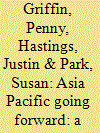

|
|
|
|
|
| Publication |
2013.
|
| Summary/Abstract |
As one of the preeminent academic conferences on international studies in the Asia Pacific, the 2012 Oceanic Conference on International Studies, held at the University of Sydney (with co-sponsors at the University of New South Wales, the University of Technology, Sydney, and Macquarie University) from 18 to 20 July, played host to a large number of academics and international analysts who presented research on a variety of international studies topics. After a very successful conference in Auckland that emphasized the connection of the OCIS community to the Oceanic region, it seemed fitting that the conference would come to Sydney, the largest city in the Oceanic region, and one of the premier global cities in the Asia Pacific. In part because of the location of the conference, and because of the emphasis of many of the conference presentations on the Asia Pacific, no doubt inspired by underlying trends that are both exciting and worrying (sometimes at the same time), the organizers decided to focus this special issue of Global Change, Peace and Security on the challenges that the Asia Pacific faces, now and in the future. In short, this special issue is about the Asia Pacific going forward.
|
|
|
|
|
|
|
|
|
|
|
|
|
|
|
|
| 3 |
ID:
126105
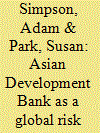

|
|
|
|
|
| Publication |
2013.
|
| Summary/Abstract |
The Asian Development Bank (adb) is engaged in development projects throughout the Greater Mekong Subregion, although for most of the past two decades it has boycotted Myanmar (Burma) because of donor government sanctions. Despite being criticised for its neoliberal focus and its lack of transparency and accountability, the adb's operations compare favourably to those of the Myanmar government and many transnational corporations constructing and financing projects there. This article engages with the concept of risk, which increasingly frames how development in fragile states like Myanmar is understood, to critically analyse the adb's nascent re-engagement in Myanmar according to the risks this poses for five constituencies: the adb itself; donor states; the Myanmar government and military; private capital; and marginalised communities. While deeper engagement in Myanmar poses different risks for each group, critical analysis suggests that the adb must increase the genuine participation of civil society actors in its activities to address the most significant risks of all, those facing marginalised communities.
|
|
|
|
|
|
|
|
|
|
|
|
|
|
|
|
| 4 |
ID:
094023
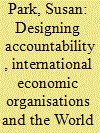

|
|
|
|
|
| Publication |
2010.
|
| Summary/Abstract |
Over the last two decades, demands for greater international economic organisation (IEO) accountability have been both prominent and vitriolic. This article demonstrates how an influential IEO, the World Bank, took up concerns of its lack of accountability through creating the Inspection Panel in 1993, in response to civil society pressures and member state demands. Drawing loosely on John Campbell's argument that ideas operating in the 'foreground' and 'background' influence policy decisions, it traces how the idea of external accountability gained strength, leading to the Inspection Panel's emergence. This contrasts with competing rational design explanations that derive 16 conjectures to explain why states design the institutions they do. The article proceeds in four parts: first, the basis for examining IEO and World Bank accountability is outlined, before detailing how a rational design argument would apply to the establishment of the Inspection Panel. A constructivist account of how ideas of accountability emerged and shaped the policy formation process is then provided, which establishes a comprehensive explanation of how and why the Inspection Panel was created the way it was and not otherwise. The conclusion then reflects on the importance of the formation of external accountability mechanisms for IEOs and of ideas in shaping international institutions.
|
|
|
|
|
|
|
|
|
|
|
|
|
|
|
|
| 5 |
ID:
114085
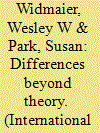

|
|
|
|
|
| Publication |
2012.
|
| Summary/Abstract |
Over the past two decades, one of the main themes in IR theory debates has been a concern for the interplay of agents, structures, and change. In this article, we engage with these debates as they pertain to "the state of the art" by highlighting in broad fashion three "constructivist turns" and their implications for efforts to explain the rise and demise of norms. More specifically, we offer a stylized history of a debate marked by shifting emphases on structural constraints, strategic practices, and sentimental forces. In the context of this symposium, while we accept many of our colleagues' critiques of extant scholarship, we draw on the work of Richard Rorty to argue that the most important differences pertain to matters "beyond theory," regarding the effects of norms in enabling the establishment of either an open community or disciplinary society.
|
|
|
|
|
|
|
|
|
|
|
|
|
|
|
|
| 6 |
ID:
131888
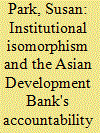

|
|
|
|
|
| Publication |
2014.
|
| Summary/Abstract |
In the 1990s Multilateral Development Banks created accountability mechanisms (AMs) that allowed people affected by development projects redress. Currently undertheorized, this paper examines how and why the Asian Development Bank (ADB) created an AM, and whether the AM serves its purpose to hold the ADB to account and to provide 'fair hearing of the views of the affected group'. This article argues that the ADB created a new AM because of institutional isomorphism, borrowing the idea of the AM from the World Bank as a result of coercive and mimetic isomorphic processes. Further, that the ADB introduced a mechanism ill-suited to the pre-existing (old) organizational culture of the ADB, which is based on consensus and hierarchical rule-following in the context of ADB operations to further economic growth while upholding state sovereignty. Despite its restructure and recent review, the mechanism's weakness was revealed through a stand-off between China and the AM over an investigation begun in 2009 (creating something 'blue'). The paper concludes that the AM's ability to serve its purpose will remain hampered as long as ADB maintains consensus around economic growth and state sovereignty over providing recourse to affected people.
|
|
|
|
|
|
|
|
|
|
|
|
|
|
|
|
| 7 |
ID:
072695
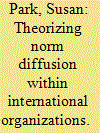

|
|
|
|
|
| Publication |
2006.
|
| Summary/Abstract |
International Organizations (IOs) promote and diffuse norms within world politics. This prompts the question: where do these norms come from? This inquiry analyses how IOs have been perceived within the emerging norms literature where IOs are 'norm diffusers' within the international system, and finds that the way in which IOs themselves internalize norms has not been taken into account. This poses a potentially fruitful new avenue of inquiry into why and when IOs behave as norm diffusers. An interpretation of when and why IOs internalize norms is offered by positing that IO identities are not fixed and that they are 'norm consumers' socialized by state and non-state actors.
|
|
|
|
|
|
|
|
|
|
|
|
|
|
|
|
| 8 |
ID:
079573
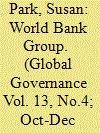

|
|
|
|
|
| Publication |
2007.
|
| Summary/Abstract |
It is well documented that international organizations diffuse norms, but how and why do they do so? I compare how the World Bank and the Inter national Finance Corporation attempt to spread sustainable development norms through their compliance, mainstreaming, and diffusion efforts. I propose that international organizations spread norms in different ways as a result of their roles within their respective social environments. The International Finance Corporation champions sustainable development by spreading core practices throughout the project finance industry, while the Bank attempts to do so through core and noncore activities. The different approaches raise questions about the capacity of each organization to champion environmental norms: the Bank's multiple activities mixes its environmental message as opposed to the International Finance Corpora tion's single (recently lessened) environmental voice
|
|
|
|
|
|
|
|
|
|
|
|
|
|
|
|
|
|
|
|
|